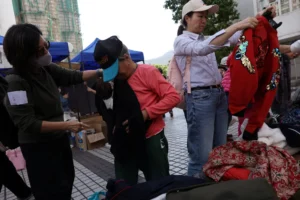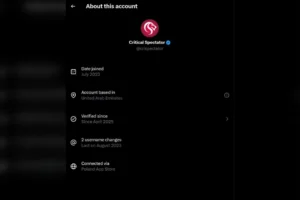
MANILA – It started with a 100 peso (S$2.25) bet on a game she found through a Facebook advertisement.
Ms Ana Reyes (not her real name), a 28-year-old clothes vendor in the southern Philippine province of Davao del Norte, still remembers the thrill of her first win.
In 2023, she deposited a small amount via local e-wallet GCash to try her luck in an online slot game. That same day, she walked away with a surprise 3,000 peso payout.
For a mother raising two toddlers with her husband, who sells balut, or fertilised duck eggs, on the streets at night, it felt like a miracle.
“As a first-time player, I was so happy,” Ms Reyes told The Straits Times, on condition of anonymity. “I honestly thought online gambling would finally help us escape poverty.”
At one point, she won as much as 30,000 pesos by betting 3,000 pesos. But the quick win was a trap.
Soon she was suffering losses and borrowing money from friends she deceived just to keep playing. Her husband got pulled in too.
They were hooked for about a year, losing tens of thousands of pesos. It was not until Ms Reyes began fighting with her husband over money that she snapped out of it. She turned to prayer, deleted all gambling apps from her phone, blocked the platforms and destroyed the SIM card she used for betting.
“I really hope the government bans online gambling,” she added. “It’s a big no. It almost destroyed my family.”
Her story is increasingly becoming common across Filipino households. Lawmakers and church leaders raised the alarm in July 2025, citing an uptick in cases where online gambling or e-games tore families apart, depleted savings and pushed students into financial ruin.
More than 80 gaming platforms are legally registered with the government and run by local operators. And the revenue from e-games by the state-run Philippine Amusement and Gaming Corporation (Pagcor) has become a key source of government revenue.
The government has acted to try to address gambling.
President Ferdinand Marcos Jr in 2024 banned offshore online casinos, called Pogos,
that were linked to Chinese crime syndicates operating in the Philippines.
But the local online platforms remain the biggest and greatest threat, and calls are mounting for tougher regulation.
“It’s clear that online gambling is no longer just a simple form of entertainment. It has become a deep and widespread moral problem, hidden behind the guise of leisure and technology,” said Cardinal Pablo Virgilio David, president of the Catholic Bishops’ Conference of the Philippines, in a Facebook post on July 8.
Support groups for gambling addicts have surfaced on Facebook and Reddit in recent months. In one Filipino-language Facebook group reviewed by ST, users posted anonymous confessions about hidden debts, broken relationships and even suicide attempts.
One post came from a student who admitted stealing his mother’s credit card information just to keep placing bets.
The ads for these gambling platforms are now everywhere, from TikTok and Facebook feeds to massive billboards along the busiest highways. The ease of access has made gambling just one click away for nearly anyone with a smartphone.
Online gambling is a major economic force in the country. From January to May 2025, gross gaming revenues from e-games by Pagcor hit 51.39 billion pesos.
In 2024, the same platforms generated 154.51 billion pesos worth of government revenue, significantly higher than the 58.16 billion pesos in 2023. This is the total amount of money the government earned after paying out winnings.
There is no official data on how many Filipinos are addicted to online gambling in a nation with a population of 117 million people, but front-liners said the red flags are multiplying.
“Before the Covid-19 pandemic, maybe two in every 10 of our patients were hooked on gambling, but online platforms weren’t a thing then.
“But now, you will see that seven out of our 10 monthly admissions are addicted to online gaming,” said Mr Jon Ty, chairman of Bridges of Hope. The latter is a network of 13 rehabilitation centres across the Philippines providing treatment for drug, alcohol, gambling and behavioural addictions.
As a recovered casino addict himself, Mr Ty said the ease of access to online casinos makes it a challenging issue to fight.
“When I was addicted, I had to dress up and drive to a brick-and-mortar casino. That was in 2011,” he noted.
“Nowadays, it’s more convenient for anybody just to grab their cellphones and gamble while they’re in the bathroom. They can do it while they’re working. They can do it while they’re cooking, while they’re at home.”
A bet can start from as low as 20 pesos.
Mr Ty supports a Bill filed on July 4 by Senator Juan Miguel Zubiri seeking to ban e-gambling in the country, raising concerns over lax enforcement and the platforms’ accessibility. Mr Zubiri said locally operated gaming sites must be shut down.
“We already shut the doors on Pogos for the damage they caused. But an even more dangerous problem has crept into our homes: online gambling that targets our own people,” he added.
Senator Sherwin Gatchalian is pushing for tighter regulation. He told ST that a ban would only drive players to underground sites that are harder to monitor.
His Bill seeks to raise the minimum playing age from 18 to 21 and require know-your-customer checks, such as identity submission before users can play. It also proposes a 10,000 peso minimum bet, a 5,000 peso top-up limit and a ban on celebrity endorsements, which he said lure young people into gambling.
“A lot of our basketball players, for example, are being idolised by the youth. Then all of a sudden, they see their idol promoting gambling,” Mr Gatchalian said. “They have to be responsible because their identity is power, their fame is power.”
For 21-year-old university student John Santos (not his real name), online gambling started as a form of casual entertainment. Taught to play mahjong and cards as a child, he was introduced to e-games at 17 by an older friend. Using GCash, he would bet 20 pesos at a time on blackjack.
He imposes a 1,000 peso monthly cap from his 16,000 peso allowance but keeps the habit secret from his parents.
“I know how they’d react. They’d say I shouldn’t be doing it, so I’d rather just keep it a secret,” he told ST. He supports regulation of online gambling, but not a minimum 10,000 peso bet, which would exclude players like him.
Under growing public pressure, Pagcor has begun to act.
It has ordered the removal of e-gambling billboard ads and pledged to limit television promotions. Pagcor has given licensees, suppliers and gaming venue operators until Aug 15 to remove ad materials.
The agency said it is open to tighter regulation but warned that a full ban could push gambling into unregulated black markets.
Local fintech players like GCash and Maya have agreed to strengthen age verification and monitoring systems. However, critics argue that the safeguards remain too easy to circumvent, particularly for tech-savvy young people.
President Marcos has yet to take a clear stance on this matter. His spokesman said he is open to taxing online gambling “if well studied” but offered no definitive position on whether the industry should be regulated or banned outright for now.
Amid concerns over lost revenue, Mr Gatchalian said the government should explore safer income streams and instead promote physical casinos, which are harder to access.
“Brick-and-mortar casinos are required to invest in facilities. So you see hard investments, you see employment. Whereas for e-games, it’s just one room with servers and a few people running it,” he noted.
Recovering addicts like Ms Reyes welcome all these proposed reforms. She and her husband no longer bet on e-games as of January 2025. They were able to save money to buy a plot of land where they plan to build their own home soon.
She knows that not everyone will be as lucky, so she hopes the government will clamp down on online gambling soon.
“These e-games teach you how to lie, how to hurt your family. So I completely support all efforts of our government now to stop it,” she said.





